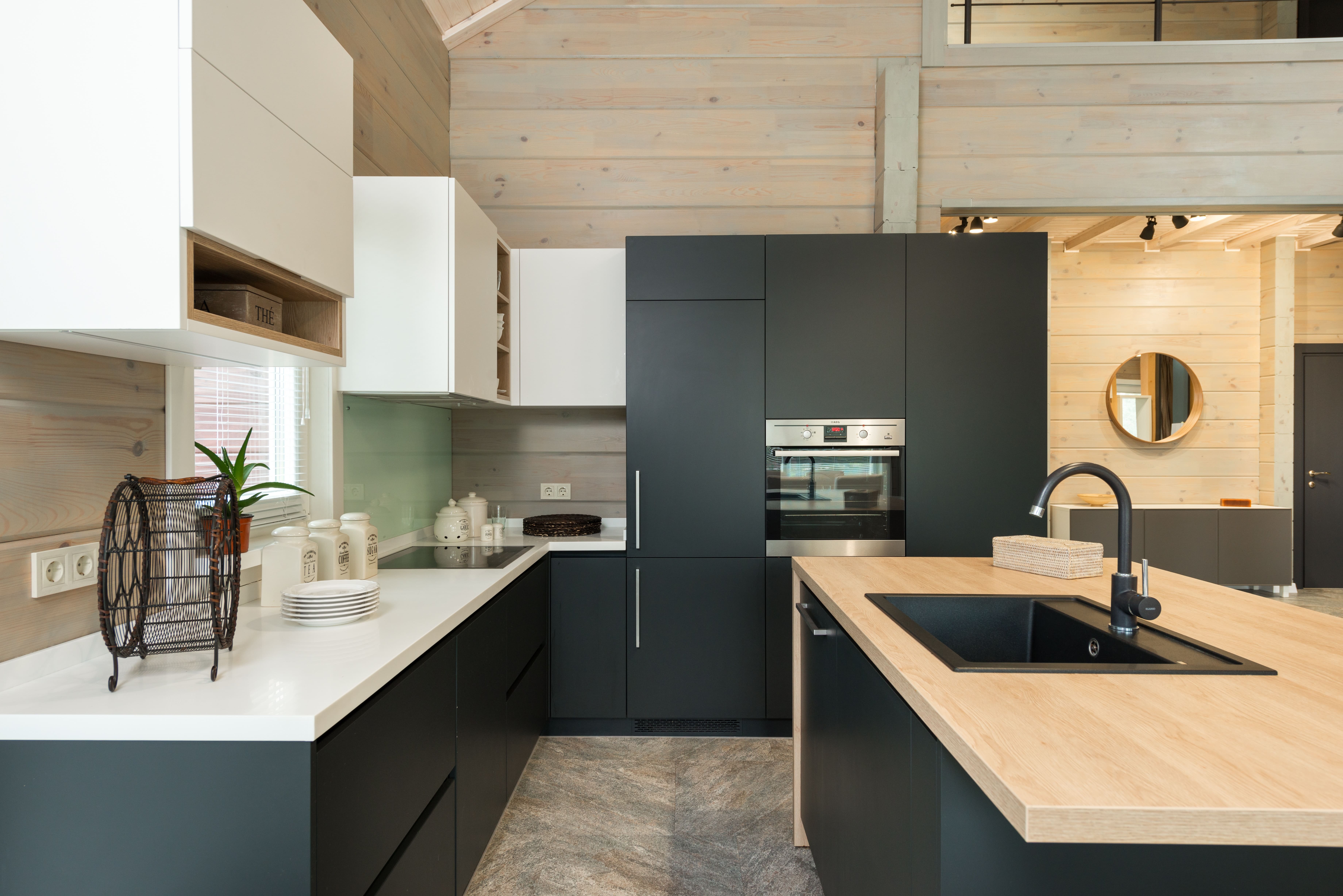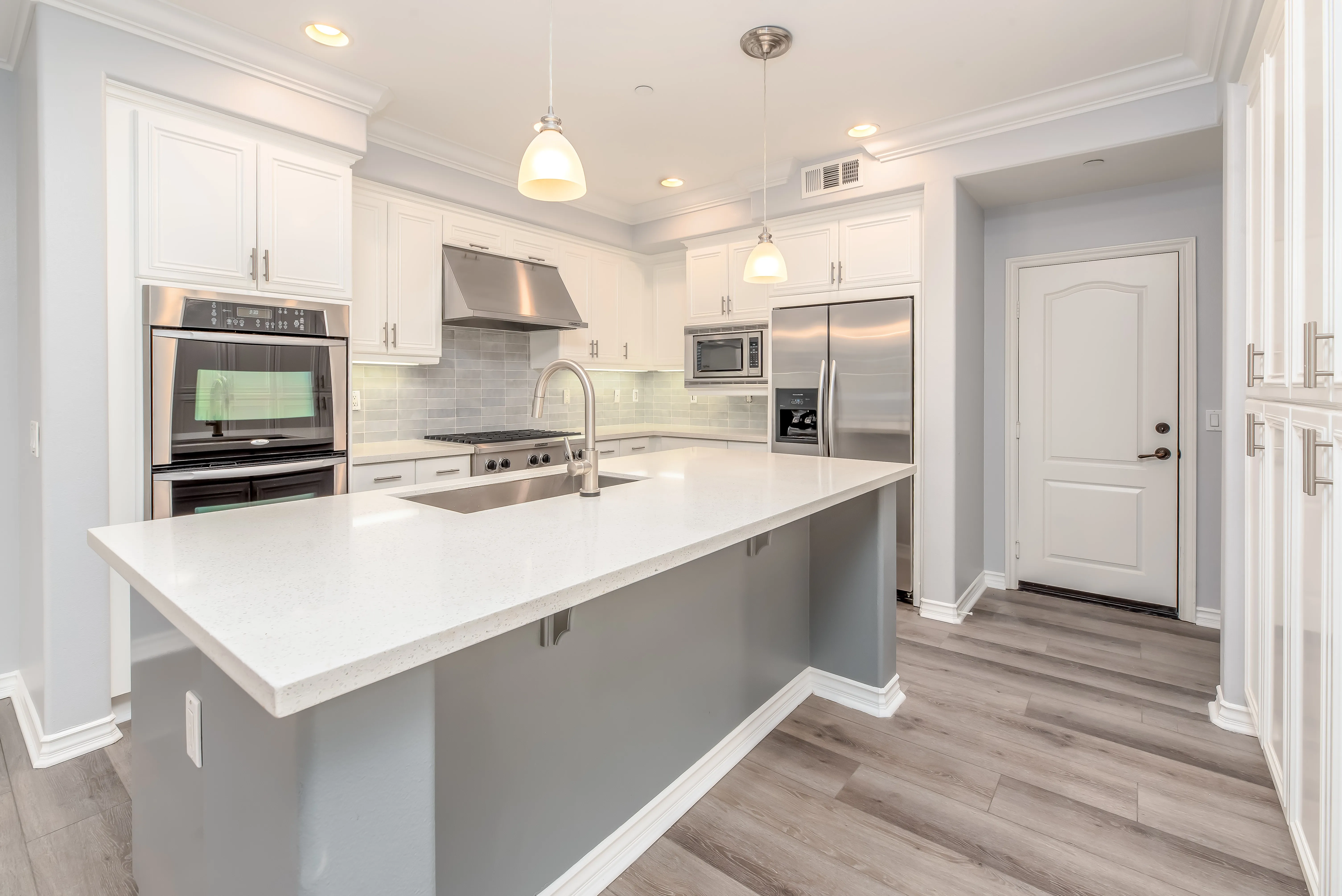Understanding the Basics of Kitchen Counter Installation
Before installing kitchen counters, you need to measure the space and select the right materials. Kitchen counters are a great way to add style and functionality to any kitchen. When selecting materials for your kitchen counters, you want to make sure you choose something that is durable, easy to clean, and able to stand up to wear and tear. You also want to consider the overall look of the countertops to ensure that they fit in with the overall design of your kitchen. Ultimately, the right kitchen counter material will be determined by your budget, lifestyle, and desired aesthetic. You should also take into account how much weight the counter can support and how it needs to be secured in place when considering kitchen countertops.
Weight capacity is an important factor in choosing a countertop as you want to make sure it can support the weight of whatever you place on it. Additionally, how the countertop is secured to the base of the counter is an important factor. Depending on the type of countertop, there are different types of securement methods that may need to be used. Knowing what type of securement method is needed will help ensure the countertop is properly and securely attached. Furthermore, it is important to note that the installation of a kitchen countertop should always be left to professionals if you are not already experienced in moderate to large DIY projects. However, if you wish to tackle the project yourself, the experts at DIYwithHelp.com can help you plan, or assess whether you’ll be able to take on the project at all. Doing so will help you enjoy your kitchen countertop for years to come!
Setting a Budget for Your Kitchen Counter Installation Project
Setting a budget for your kitchen counter installation project is important to ensure that you don't overspend. Planning ahead and researching your options can help you determine an appropriate budget for the project. When choosing countertops for your home, consider how much you are willing to invest in the project, taking into account any existing countertops that may need to be replaced, as well as any additional installation costs. Additionally, you should research the different types of countertops available and compare the prices, features, and durability of each material to find the best option for your home. With careful planning and budgeting, you can ensure that you make the most of your kitchen counter installation project. It is also important to research the different materials and styles available to find something that fits within your budget when choosing kitchen counters.
Marble and granite are popular materials, and quartz is becoming more popular due to its durability and lower cost. Laminate countertops are a less costly option, while butcher block and solid surface countertops offer more resilience and design options. Consider the size of your kitchen, the frequency of use and the look you are hoping to achieve before making your decision. With the right research, you'll find the perfect kitchen counter to fit both your budget and your needs.All in all, home kitchens have several countertop options from which to choose. Whether you opt for the more classic look of granite, or go with a modern quartz option, there are many benefits to each. Additionally, you should factor in the cost of installation and any additional costs such as tile and grout cleaner or sealer when making your purchase decision. Finally, be sure to select a countertop material that fits within your budget and lifestyle.

Exploring Different Materials and Finishes for Kitchen Countertops
Granite is a popular choice for kitchen countertops, thanks to its durability and range of finishes. Installing granite countertops requires careful planning, as they are a big investment. It is important to consider your budget, lifestyle, and the design of your kitchen when selecting your granite countertop material. Granite countertops come in a variety of colors and patterns, so you should take time to look at the different options available. In addition, you'll want to consider the cost of installation and the maintenance required to keep your granite countertop looking its best. With the right care and maintenance, granite countertops can last for decades, making them a great choice for any kitchen.
Quartz countertops are also becoming more popular, since they are non-porous and easy to maintain. They are a great choice for any home, as they do not require regular sealing, and they offer a variety of colors and styles to choose from. Additionally, quartz countertops are heat-resistant, so they are ideal for hot pots and pans. They are also extremely durable and scratch-resistant, so they are perfect for handling all types of kitchen tasks. Overall, quartz countertops provide a stylish, easy to maintain option for a home kitchen.
Moreover, kitchen counters offer an array of materials to choose from besides the traditional granite and laminate. Concrete, marble, and stainless steel are all viable options for creating a unique countertop design. Each of these materials offers different advantages that can range from affordability to durability. Additionally, many are very easy to maintain and clean making them an ideal choice for a busy kitchen. It is important to research each option in order to pick the best material for your home's specific needs.
Choosing the Right Professional for Your Kitchen Counter Installation
We’ll depart from the DIY theme in this blog and site. Kitchen counter installation can be a tough project. If you decide to outsource this project, it is important to find a professional kitchen counter installer who is experienced in the type of countertop you are looking for. If you are replacing an old countertop, you want to make sure that the installer is adequately qualified to remove and reinstall the new one.
There are many variables to consider when replacing a countertop, such as the material, color, and thickness of the countertop itself. These are good question sets to ask your expert. Additionally, the installer needs to be familiar with the type of countertop edging, the correct method of installation, and the type of sink and other hardware that needs to be installed. Finally, the installer needs to understand the proper sealing and sealing techniques required to keep the countertop in good condition.
Taking the time to find a professional kitchen counter installer experienced in the type of countertop you are looking for will help ensure you get the quality results that you deserve.You should also look for someone who can offer a warranty on their work and has good customer reviews when selecting a provider for your kitchen counter installation.
It's important to investigate the reputation of the company you decide to work with, as you want to ensure you are getting the best quality product and service possible. Take a look at the reviews and feedback from their previous customers and make sure they have a good record of customer satisfaction. Additionally, make sure they can provide a warranty on the products they install to protect your investment.
With the right installation, you can have a beautiful kitchen counter that will last for years to come. Meanwhile, replacing kitchen counters is a large and expensive job, so it's important to shop around to make sure you get the best deal. Make sure to get a few different estimates from different installers, so that you can compare prices and services offered. Doing this will not only help ensure that you're getting the right product at the right price, but also guarantee a quality installation. Taking these steps will give you peace of mind when tackling such an expensive project in your home.
Preparing Your Kitchen for Installing Counters
Clear out your kitchen cabinets and drawers to make room for the new counter installation. Before installation begins, you should prepare your home for the counter installation process. This will involve removing all items from cabinets and drawers, as well as disconnecting any appliances that may be in the way. You should also make sure that any walls in the vicinity of the counter are clean and clear of any nails or screws that may interfere with the installation process. Additionally, it is a good idea to cover any furniture near the counter with sheets or blankets to protect them from dust, debris, and scratches. Taking these simple steps will ensure that the counter installation process runs smoothly, and that you are happy with the results.
Disconnect your existing sink and any other plumbing fixtures so they can be properly reconnected later. This is an important step when replacing or installing kitchen counters in a home. Installing the countertop first, then reconnecting the sink and other fixtures, allows for a seamless installation and an optimal end result. If you are replacing a kitchen counter, be sure to properly measure and order it prior to disconnecting your plumbing fixtures to ensure a proper fit before installation. Once the countertop is measured, ordered, and delivered, you can begin the installation process.
Finally, when replacing your kitchen countertop, it is important to measure the area accurately to make sure that the right size counter is purchased. This will help ensure that you have a countertop that fits perfectly in the space without any issues. Accurately measuring for your new kitchen countertop is essential for a successful replacement.
Final Tips and Tricks for a Successful Kitchen Counter Installation
Measure twice, cut once - be sure to double-check your measurements before you start cutting when it comes to installing kitchen counters. It is important to get the length and width of your countertops right, so that they will fit perfectly with your kitchen cabinets and walls. If you're ordering prefabricated counters, make sure to leave a few inches of space for the seams when installing. If you're going with a custom cut counter, be sure to measure and re-measure your kitchen, and provide the exact measurements to your fabricator. Don't forget to factor in the thickness of the countertop material when making your measurements. Taking the time to get it right will ensure that you'll end up with a stylish, high-quality kitchen counter that fits your space perfectly.
Make sure to use the right tools for the job - a jigsaw is great for cutting curves, while a circular saw is better for long straight cuts. When it comes to kitchen countertops, these tools can make a big difference in the quality of the cut and the overall look of the counter. For curved edges, a jigsaw is the best choice, as it allows you to create perfectly round edges without any jagged edges that may be present with other cutting tools. For more robust counter material such as granite, a circular saw may be the best way to ensure a smooth, even cut. In either case, using the right tool will ensure that your kitchen counter looks great and is installed correctly. Again, pre-drilling holes in your counter before attaching brackets or screws is an important step when renovating a kitchen. This helps ensure that everything lines up properly and reduces the risk of cracking or splitting your countertop. As such, it should be a priority for any kitchen renovation project.
For more DIY tips and tricks, DIYwithHelp have got you covered…
If you need some professional guidance for your project, be sure to sign up for a free account with DIYwithHelp.com. Once you have an account, you can search our site (or fill out a project request form) and connect with expert tradespeople who are willing to lend their advice over scheduled video-calls.






